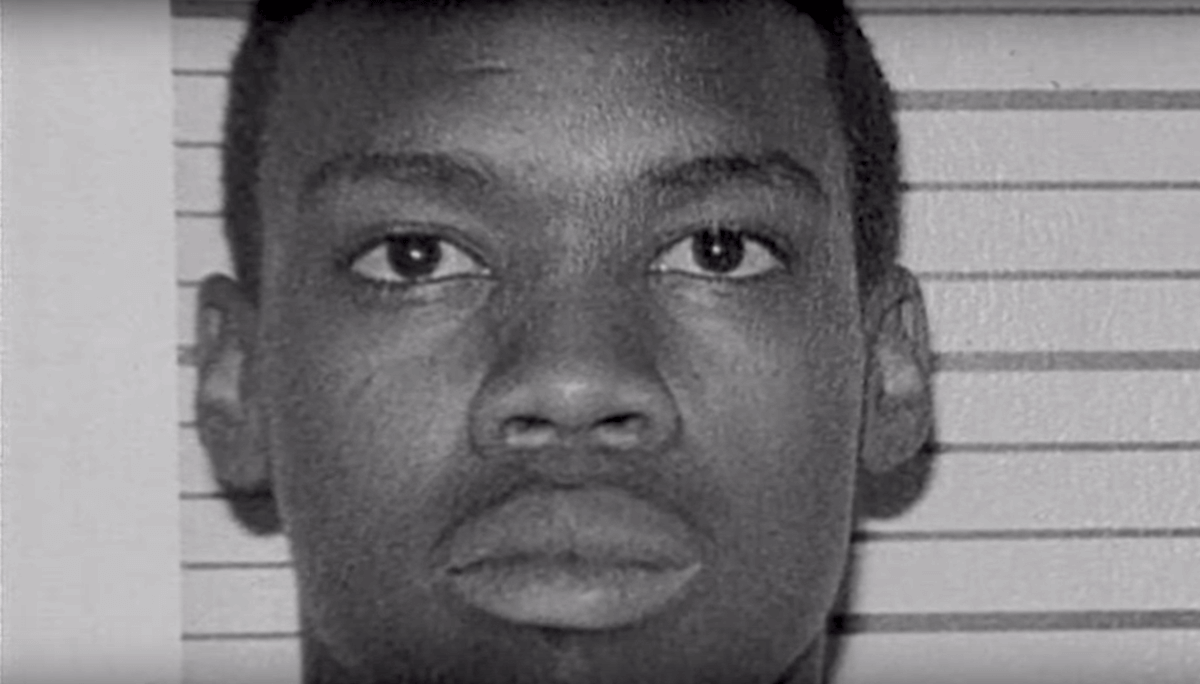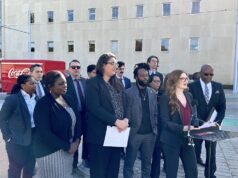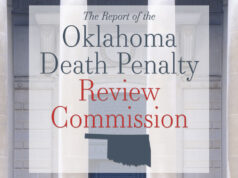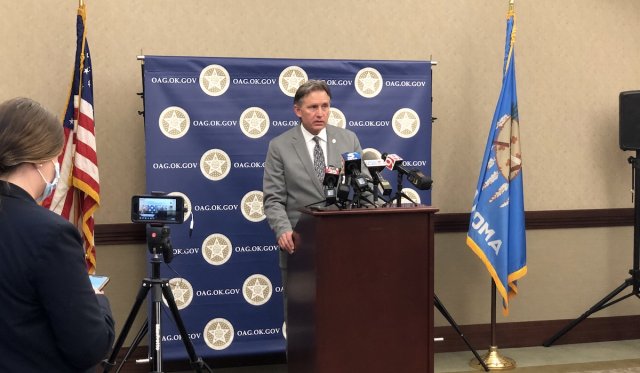
Days after meeting with the family of 1999 murder victim Paul Howell, Oklahoma Attorney General Mike Hunter gathered media to reiterate “overwhelming evidence of guilt” against death-row inmate Julius Jones.
Hunter released a document about Jones’ conviction and chronicled “key facts” he said are “being manipulated to fit a narrative in an orchestrated effort to get Mr. Jones off of death row and perhaps out of prison entirely.”
“I’m here today as an advocate for the late Paul Howell and his family, and I am here to advocate for the justice that our legal system imposed,” Hunter said. “They are the victims in this case, make no mistake about it, and the pain of their loss is revisited with each misguided public appeal on Mr. Jones’ behalf.”
RELATED
Julius Jones’ clemency application draws national attention by Archiebald Browne
Jones has maintained his innocence. As part of a campaign to support Jones, prominent athletes with Oklahoma ties have written Gov. Kevin Stitt letters this year asking for the first-term governor to commute Jones’ death sentence.
Hunter said a preponderance of evidence resulted in a jury convicting Jones beyond a reasonable doubt.
“Julius Jones murdered Paul Howell in cold blood in front of his sister and daughters,” Hunter said somberly. “No celebrity imploration or profusion of misinformation will change that. The information we are releasing today is from the trial transcript, and it disproves every claim that he is innocent. I strongly encourage those calling for his commutation to read the compelling evidence in this document. Julius Jones had his day in court — numerous times.”
Jones and his supporters have alleged bias in his original trial, and they have argued that another man who pleaded guilty in the deadly robbery, Chris Jordan, conspired to frame Jones.
‘Evidence overwhelmingly establishes Jones’ guilt’
The 12-page document Hunter referred to (embedded below) outlines the criminal investigation into Howell’s death, the arrest and conviction of Julius Jones, and failed appellate efforts on his behalf. The document refers to trial transcripts, notes that the Oklahoma Court of Criminal Appeals found “overwhelming” evidence of Jones’ guilt in 2006 and says Jones — now 39 — also committed other armed robberies in 1999.
One section of the document concludes:
An eyewitness to the murder saw a red bandana over the shooter’s face. The murder weapon was found in attic space above Jones’ closet, wrapped in a red bandana. This bandana contains Jones’ DNA. The evidence overwhelmingly establishes Jones’ guilt.
“Julius Jones is guilty,” Hunter said Monday to media members. “He murdered Paul Howell, and he needs to be held accountable.”
 Loading...
Loading...
Jones’ mother reiterates alibi claim
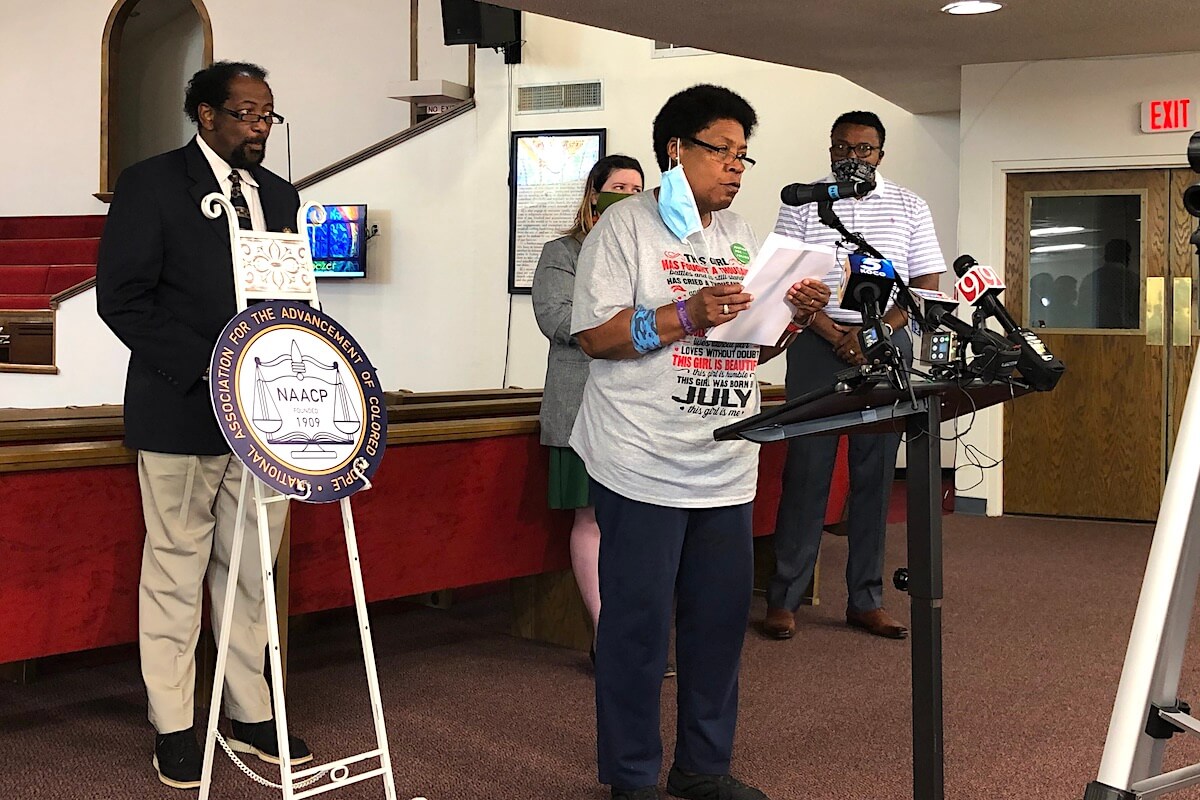
Members of Julius Jones’ family, his current legal team and a coalition of supporters believe otherwise.
T. Sheri Dickerson, founder of the Oklahoma City chapter of Black Lives Matter, attended Hunter’s press conference and spoke to media immediately after.
“It was consistent with what the attorney general and the prosecutors have been presenting. I still believe in Mr. Jones’ innocence,” said Dickerson, who emphasized that she was not speaking on behalf of Jones’ lawyers or his supporting coalition. “I’m speaking from probably a different aspect than other people. I am a daughter of someone who was murdered. Those that were held accountable were also given the death penalty, and that death penalty was literally commuted to life without parole.”
Dickerson said she opposes the death penalty, and she said BLM OKC intends to keep commutation of Jones’ death sentence on its list of demands.
About two hours after Hunter concluded his remarks, other supporters of Jones held their own press conference at Ebenezer Baptist Church. Madeline Jones-Davis, the mother of Julius Jones, read a statement.
“First, I would like to say that nothing I am about to say is intended to prevail lives or dismiss the terrible tragedy that Mr. Paul Howell’s murder and the pain that his family is experiencing,” Jones-Davis said. “My son Julius is not guilty of Mr. Howell’s murder, and his conviction and death sentence is a terrible injustice.”
Jones-Davis said she and her husband were home with their son on the 1999 evening when Howell was murdered.
“On the day of the shooting, Julius arrived home to our house around 4 p.m. and stayed there until he went to bed hours after the murder was committed,” Jones-Davis said, noting that the children played Monopoly. “We ate spaghetti and cornbread. Julius and his father watched Dragonball Z.”
But Hunter’s document citing trial and appellate transcripts states that two of Jones’ original attorneys chose not to raise his parents’ alibi because Jones “repeatedly” told them his family was mistaken and that he was not home.
“Jones was ‘unequivocal that he was not at home with his parents, as his parents had described, with regard to the evening that Mr. Howell was murdered,'” the document states, quoting a March 2005 transcript.
Nicole McAfee, director of policy and advocacy for the Oklahoma chapter of the ACLU, said she does not believe the information presented by Hunter earlier in the day.
“We largely believe most of it is inaccurate,” McAfee said. “What we’re asking for now is a chance to refute that at the Pardon and Parole Board in a commutation hearing. (…) We are asking for Julius to have a chance to tell that story.”
Anthony Douglas, president of Oklahoma’s NAACP chapter, said racial bias played a role in Jones’ conviction.
“Look at this case,” Douglas implored of Hunter and Stitt. “Don’t just execute him because he is a Black man and you’ve got some new drugs you want to test on a Black man.”
One of Jones’ current attorneys, federal public defender Dale Baich, released a statement criticizing Hunter.
“Julius has never denied that, in his youth, he committed several, non-violent petty thefts which he has regretted ever since. Prior to his arrest for the murder of Paul Howell, however, Julius had never committed or been charged with a violent crime. The attorney general’s allegations that Julius was a violent criminal as a youth are just that: allegations. Moreover, these are the same allegations of uncharged, and unproved conduct that the prosecution paraded before Julius’s jury 20 years ago to argue that he deserved to die,” Baich said. “It is disturbing that the attorney general would portray Julius as a violent black youth based on allegations never proved in court resemble the all-too familiar pattern of state actors disparaging the characters of Black victims of systemic racism and inequality to detract from, if not legitimize, what happened to them.”
Baich has argued previously that the red bandana was planted in Jones’ house and tested positive for his DNA owing to its location inside his house.
Jones’ case was the focus of a 2018 episode of The Last Defense, a docu-series produced by ABC. After it aired, Jones’ case drew national attention.
Hunter: ‘I’m just doing my job’
Hunter reiterated the contents of a letter he wrote last week to the Oklahoma Pardon and Parole Board affirming a 2012 Attorney General’s Opinion that the board can recommend and the governor can grant commutation to those on death row. He took umbrage at prior statements from Jones’ legal team which speculated that he might argue a different interpretation.
RELATED
Griffin, Westbrook, Young: Commute the sentence of Julius Jones by Tres Savage
“There is a great deal of misinformation out there that we are dealing with,” Hunter said. “I can’t count the number of emails I have gotten (…) We’ve heard from a lot of celebrities. I know they believe they are doing the right thing based on what they have been told. I’m just not sure they have been told the right thing.”
The Oklahoma Pardon and Parole Board has yet to decide whether to hold a hearing on Jones’ clemency application, which was filed in October.
Asked about whether he anticipates criticism for challenging the claims of Jones’ advocates, Hunter said he was “just doing my job.”
“This is a great job, but it’s a tough job. I’m not interested in any other jobs,” said Hunter, who was elected to the state’s top law enforcement position in 2018 after being appointed to fill a 2017 vacancy. “There’s a reason why attorney generals don’t get elected to other things in this state, and that’s because you have to make a lot of tough decisions.”
Hunter said Monday that he felt compelled to push back on “misinformation” about Jones’ case after meeting with Howell’s family.
“I was moved by conversations I had with the family last week,” Hunter said. “They just don’t feel like there is anybody advocating on their behalf. They don’t feel like there is anybody reminding people that they are victims and that they shouldn’t have had to deal with this.”










